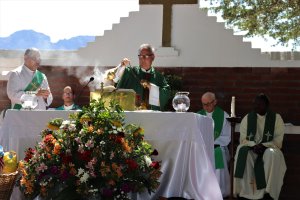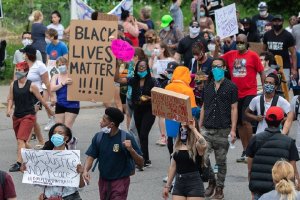At the epicenter of turmoil in the wake of the killing of George Floyd, the black pastor of a racially diverse Minneapolis congregation has found himself mentor to the ministers of white-majority churches committed to combating racial injustice and forging meaningful social change.

“I get calls nearly every day from around the country and even one from Switzerland,” said Edrin Williams, pastor of Sanctuary Covenant Church, in an article in the Minneapolis Star Tribune, “They ask, ‘What should we be doing?’”
“There’s something special happening at this moment,” says Williams. “People are seeing the barriers who haven’t seen them before.”
African American religious leaders at the center of the civil rights movement are actively “working to quell community tensions and exploring new strategies to combat racial injustice.” And in Minneapolis, a consortium of black churches entered into discussions with Minnesota Governor Tim Walz to create a “social compact” to build new financial investments and public policies to narrow racial inequalities.
They cite the example of Wayman African Methodist Episcopal Church in Twin Cities, which is launching a project to “transform one Minneapolis public school into a culturally appropriate model for Black achievement.”
In a recent Zoom meeting of local pastors and community leaders, Rev. Richard Coleman of Wayman AME Church said, “With the moment, the killing of George Floyd, we wanted to pick something big and significant that can really make a difference. There’s a lot of energy right now. To deal with the problems in the Black community requires a systemic approach, and I believe we are in that space now.”
Evangelical Christians in Minnesota have pledged $1 million to support local African American churches. “Many Black pastors are in demand for speaking and consultation,” reports the Star Tribune. “And, for the first time, their food programs are attracting armies of white volunteers.”
In a recent panel discussion, the very first question for Bishop Richard Howell of the Shiloh Temple International Ministries was “What is systemic racism?”
“There’s an openness to hearing us—finally—in a manner we haven’t seen before,” said Howell. “I’ve been preaching 40 years, and I’ve never seen our friends listen to the fact, and the painful facts, of African American history. We have an opportunity to share what we know with those who don’t.”
From its beginnings, the Church of Scientology has recognized that freedom of religion is a fundamental human right. In a world where conflicts are often traceable to intolerance of others’ religious beliefs and practices, the Church has, for more than 50 years, made the preservation of religious liberty an overriding concern.
The Church publishes this blog to help create a better understanding of the freedom of religion and belief and provide news on religious freedom and issues affecting this freedom around the world.
For more information, visit the Scientology website or Scientology Network.


